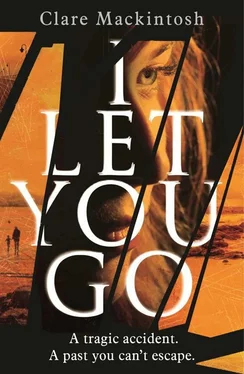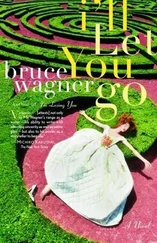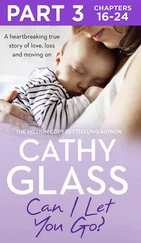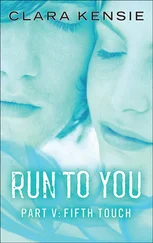I slid my hand up your leg and felt the soft, smooth flesh of your inner thigh. My fingertips brushed against lace, then you pulled your mouth away from mine, and wriggled up the sofa, away from my hand.
‘Slow down,’ you said, but your smile showed me you didn’t mean it.
‘I can’t,’ I said. ‘You’re so gorgeous – I can’t help myself.’
A pink flush spread across your face. I rested on one arm and with the other pulled up your skirt around your waist. Slowly, I ran a finger under the elastic of your knickers.
‘I don’t—’
‘Hush,’ I said, kissing you. ‘Don’t spoil it. You’re the most lovely thing, Jennifer. You turn me on so much.’
You kissed me back and stopped pretending. You wanted it just as much as I did.
27
The train from Bristol to Swansea takes nearly two hours, and although I’m desperate for a glimpse of the sea, I’m glad of the solitude and the time to think. I didn’t sleep at all in custody, my mind racing as I waited for morning. I was frightened that if I closed my eyes the nightmares would come back. So I stayed awake, sitting on the thin plastic mattress and listening to the shouts and thumps from up and down the corridor. This morning the gaoler offered me a shower, indicating a concrete enclosure in the corner of the female wing. The tiles were wet, and a clump of hair covered the plughole like a squatting spider. I declined the offer, and the stale stench of the custody suite still clings to my clothes.
They interviewed me again, the female detective and the older man. They were frustrated by my silence, but I wouldn’t be drawn on more detail.
‘I killed him,’ I repeated, ‘isn’t that enough?’
Eventually they gave up and sat me on the metal bench by the custody desk while they had whispered conversations with the sergeant.
‘We’re bailing you,’ DI Stevens said eventually, and I looked at him blankly until he explained what it meant. I hadn’t expected to be released, and I felt guilty at how relieved I was to hear that I had another few weeks of freedom.
The two women across the aisle get off at Cardiff in a flurry of shopping and nearly forgotten coats. They leave behind a copy of today’s Bristol Post , and I reach across for it, only half wanting to read it.
It’s on the front page: Hit-and-run driver arrested .
My breath quickens as I scan the article for my name, and I let out a small sigh of relief when I see they haven’t printed it.
A woman in her thirties has been arrested in connection with the death of five-year-old Jacob Jordan, who died in November 2012 following a hit-and-run in Fishponds. The woman was released on bail, to appear at Bristol Central police station next month.
I imagine this paper in homes all over Bristol: families shaking their heads and holding their children a little closer. I read the piece again, making sure I haven’t missed anything that might give away where I am living, and then I fold it carefully so the story is on the inside.
At Swansea bus station I find a bin and push the newspaper underneath the Coke cans and fast-food wrappers. The ink has come off on my hands, and I try to rub it off, but my fingers are stained black.
The bus to Penfach is late, and when I finally arrive in the village it’s getting dark. The Post Office store is still open, and I pick up a basket to collect a few groceries. The shop has two counters, at opposite ends, both staffed by Nerys Maddock, helped after school by her sixteen-year-old daughter. It is as impossible to buy envelopes at the grocery counter as it is to buy a tin of tuna and a bag of apples at the Post Office counter, and so you must wait as Nerys locks the till and shuffles from one side of the shop to the other. Today the daughter is behind the grocery counter. I fill a basket with eggs, milk and fruit, pick up a bag of dog food and place my shopping on the counter. I smile at the girl, who has always been friendly enough, and she glances up from her magazine but doesn’t speak. Her eyes flick over me, then drop down to the counter again.
‘Hello?’ I say. My growing unease turns it into a question.
The little bell above the door rings as an elderly woman I recognise comes into the shop. The girl stands up and calls through into the next room. She says something in Welsh, and a few seconds later Nerys joins her behind the till.
‘Hi, Nerys, I’ll take these, please,’ I say. Nerys’s face is as stony as her daughter’s, and I wonder if they have had an argument. She looks straight past me and addresses the woman behind.
‘ Alla i eich helpu chi? ’
They begin a conversation. The Welsh words are as foreign to me as always, but the occasional glances in my direction, and the distaste on Nerys’s face, make their meaning clear. They are talking about me.
The woman reaches around me to hand over the change for her newspaper and Nerys rings through the sale. She picks up my basket of groceries and dumps it behind the counter by her feet, then turns away from the shop floor.
The heat from my cheeks burns my face. I put my purse back in my bag and turn round, so desperate to get out of the shop that I knock into a display and cause packets of gravy mix to come tumbling down. I hear a tut of disapproval before I can wrench open the door. I walk swiftly through the village, not looking left or right for fear of another confrontation, and by the time I reach the caravan park I am crying uncontrollably. The blind on the shop window is up, meaning Bethan is there, but I can’t bring myself to go and see her. I continue along the footpath to my cottage and only then realise that Patrick’s car wasn’t in the caravan park car park. I don’t know why I expected it to be there – I didn’t call him from the police station, so he has no way of knowing I have come back – but its absence leaves me with a feeling of misgiving. I wonder if he stayed at all, or if he left as soon as the police took me away; if he wanted nothing more to do with me. I console myself with the fact that even if he found it easy to walk away from me, he wouldn’t abandon Beau.
I have the key in my hand before I realise that the red on the door isn’t an optical illusion, caused by the setting sun, but smears of paint, crudely brushed on with a clump of grass that now lies abandoned at my feet. The words have been written in a hurry; splashes of paint covering the stone doorstep.
GET OUT.
I look around, half expecting to find someone watching me, but dusk is creeping in and I can’t see further than a few feet. I shiver and battle with the key, losing my patience with the temperamental lock and kicking the door hard in frustration. A shard of dried paint flies off and I kick it again, my pent-up emotion venting itself in a sudden and irrational rage. It doesn’t help with the lock, of course, and eventually I stop, leaning my forehead against the wooden door until I’m calm enough to try the key again.
The cottage feels cold and inhospitable, as if it is joining the village in wanting me out. I know without calling for him that Beau isn’t here, and when I go into the kitchen to check that the range is on I see a note on the table.
Beau is in the kennels at the surgery. Text me when you’re back.
P.
It’s enough for me to know that it’s over. I can’t help the tears welling up and I screw my eyes tightly shut to stop them from spilling on to my cheeks. I remind myself that I chose this path and now I have to walk it.
Aping Patrick’s curtness I send him a one-line text message and he replies to say that he will bring Beau over after work. I had half expected him to send someone else, and I feel both eager and apprehensive at the thought of seeing him.
Читать дальше












